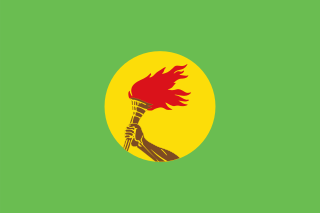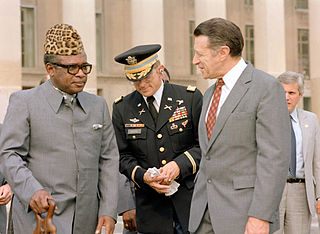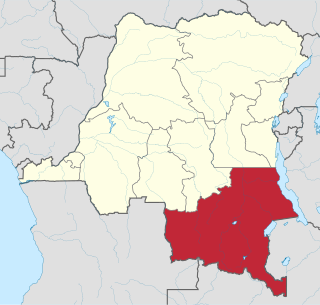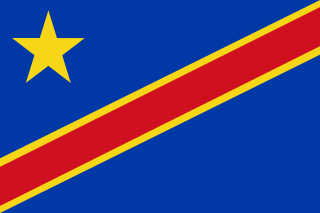Discovered in the 1990s, human remains in the Democratic Republic of the Congo have been dated to approximately 90,000 years ago. The first real states, such as the Kongo, the Lunda, the Luba and Kuba, appeared south of the equatorial forest on the savannah from the 14th century onwards.

Zaire, officially the Republic of Zaire, was a Congolese state from 1965 to 1997 in Central Africa that was previously and is now again known as the Democratic Republic of the Congo. Zaire was, by area, the third-largest country in Africa, and the 11th-largest country in the world. With a population of over 23 million inhabitants, Zaire was the most populous officially Francophone country in Africa, as well as one of the most populous in Africa.

Mobutu Sese Seko Kuku Ngbendu wa za Banga, commonly known as Mobutu Sese Seko or simply just Mobutu, was a Congolese politician and military officer who was the president of Zaire from 1965 to 1997. He also served as Chairman of the Organisation of African Unity from 1967 to 1968. During the Congo Crisis, Mobutu, serving as Chief of Staff of the Army and supported by Belgium and the United States, deposed the democratically elected government of left-wing nationalist Patrice Lumumba in 1960. Mobutu installed a government that arranged for Lumumba's execution in 1961, and continued to lead the country's armed forces until he took power directly in a second coup in 1965.

Léon Kengo wa Dondo is a Congolese politician who served as the "first state commissioner" several times under Mobutu Sese Seko in Zaïre. He was one of the most powerful figures in the regime and was a strong advocate of economic globalization and free-market economics. He served as President of the Senate of the Democratic Republic of the Congo from 2007 to 2019.

The Alliance of Democratic Forces for the Liberation of Congo-Zaire was a coalition of Rwandan, Ugandan, Burundian, and Congolese dissidents, disgruntled minority groups, and nations that toppled Mobutu Sese Seko and brought Laurent-Désiré Kabila to power in the First Congo War. Although the group was successful in overthrowing Mobutu, the alliance fell apart after Kabila did not agree to be dictated by his foreign backers, Rwanda and Uganda, which marked the beginning of the Second Congo War in 1998.

The First Congo War (1996–1997), also nicknamed Africa's First World War, was a civil war and international military conflict which took place mostly in Zaire, with major spillovers into Sudan and Uganda. The conflict culminated in a foreign invasion that replaced Zairean president Mobutu Sese Seko with the rebel leader Laurent-Désiré Kabila. Kabila's unstable government subsequently came into conflict with his allies, setting the stage for the Second Congo War in 1998–2003.

The Popular Movement of the Revolution was the ruling political party in Zaire. For most of its existence, it was the only legally permitted party in the country. It was founded by Joseph-Désiré Mobutu on 20 May 1967.

Mobutism or Mobutuism was the state ideology of Zaire during the latter half of the 20th century, when it was under the one-party rule of the Popular Movement of the Revolution. Mobutism encompassed and glorified the thoughts, visions, and policies of Zairian president and self-proclaimed "Father of the Nation," Mobutu Sese Seko. The ideology included such major Mobutu initiatives as "Zairianization."

The abacost, a blending of the French "à bas le costume", was the distinctive clothing for men that was promoted by Mobutu Sese Seko as part of his authenticité programme in Zaire, between 1972 and 1990. Zairians were banned from wearing Western-style suits with shirt and tie to symbolise the break with their colonial past. The abacost was a lightweight suit, worn without a tie, though sometimes with a cravat. It closely resembled a Mao suit. It was seen in long-sleeved and short-sleeved versions.

Jean Nguza Karl-i-Bond was a prominent Zairian politician.

Authenticité, sometimes Zairianisation in English, was an official state ideology of the regime of Mobutu Sese Seko that originated in the late 1960s and early 1970s in what was first the Democratic Republic of Congo, later renamed Zaire. The authenticity campaign was an effort to rid the country of the lingering vestiges of colonialism and the continuing influence of Western culture and to create a more centralized and singular national identity.

Air Zaïre was the national airline of Zaire. Its head office was located on the grounds of N'djili Airport in Kinshasa.
Mobutu Sese Seko's foreign policy emphasized his alliance with the United States and the Western world while supposedly maintaining a non-aligned position in international affairs. Mobutu ruled the Republic of the Congo and then Zaire as president for 32 years, from 1965 to 1997.

The Congolese National Liberation Front is a political party funded by rebels of Katangese origin and composed of ex-members of the Katangese Gendarmerie. It was active mainly in Angola and Zaire during the 1970s.

Democratic Republic of the Congo–United States relations are the international relations between the Democratic Republic of the Congo and the United States of America.

Democratic Republic of the Congo–Russia relations are the bilateral foreign relations between the Democratic Republic of the Congo and Russia. The Democratic Republic of the Congo has an embassy in Moscow and an honorary consulate in Yekaterinburg. Russia has an embassy in Kinshasa. The relations between the two countries were established on July 7, 1960, and restored since November 30, 1967.
In the Democratic Republic of the Congo, it is common for individuals to possess three separate names: a first name (prénom) and surname (nom) as well as a post-surname (postnom). Each form may comprise one or more elements. For example:

Democratic Republic of the Congo–Germany relations are primarily characterized by the development aid that Germany provides in the DR Congo. Germany is one of the most important donor countries to the DR Congo.














